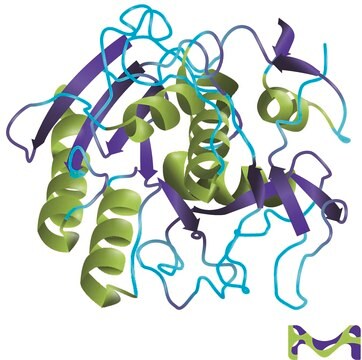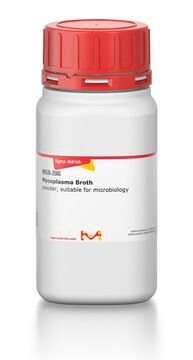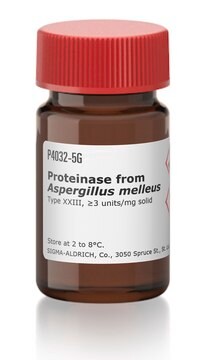539470
Proteinase K Inhibitor
Proteinase K Inhibitor is a tetrapeptidyl chloromethyl ketone compound that acts as an active-site-targeting irreversible inhibitor against proteinase K.
Synonym(s):
Proteinase K Inhibitor, MeOSuc-AAPF-CMK
Sign Into View Organizational & Contract Pricing
All Photos(1)
About This Item
Empirical Formula (Hill Notation):
C26H35ClN4O7
Molecular Weight:
551.03
UNSPSC Code:
12352202
NACRES:
NA.54
Recommended Products
Quality Level
Assay
≥97% (HPLC)
form
lyophilized
manufacturer/tradename
Calbiochem®
storage condition
OK to freeze
desiccated
protect from light
solubility
DMSO: 3 mg/mL
shipped in
ambient
storage temp.
−20°C
General description
A tetrapeptidyl chloromethyl ketone compound that acts as an active-site-targeting irreversible inhibitor against proteinase K (Cat. Nos. 539480, 70663, & 71049). Shown to be more potent than MeOSuc-AAPV-CMK (Cat. Nos. 324745) in preventing the degradation of reverse transcriptase and albumin by proteinase K.
Packaging
Packaged under inert gas
Warning
Toxicity: Standard Handling (A)
Sequence
MeOSuc-Ala-Ala-Pro-Phe-CH₂Cl
Reconstitution
Following reconstitution, aliquot and freeze (-20°C). Stock solutions are stable for up to 1 week at -20°C.
Other Notes
Kore, A.R., et al. 2009. Bioorg. Med. Chem. Lett.19, 1296.
Legal Information
CALBIOCHEM is a registered trademark of Merck KGaA, Darmstadt, Germany
Storage Class Code
11 - Combustible Solids
WGK
WGK 1
Flash Point(F)
Not applicable
Flash Point(C)
Not applicable
Certificates of Analysis (COA)
Search for Certificates of Analysis (COA) by entering the products Lot/Batch Number. Lot and Batch Numbers can be found on a product’s label following the words ‘Lot’ or ‘Batch’.
Already Own This Product?
Find documentation for the products that you have recently purchased in the Document Library.
Customers Also Viewed
Julia Joung et al.
Nature communications, 13(1), 1606-1606 (2022-03-27)
The cellular processes that govern tumor resistance to immunotherapy remain poorly understood. To gain insight into these processes, here we perform a genome-scale CRISPR activation screen for genes that enable human melanoma cells to evade cytotoxic T cell killing. Overexpression
Our team of scientists has experience in all areas of research including Life Science, Material Science, Chemical Synthesis, Chromatography, Analytical and many others.
Contact Technical Service







